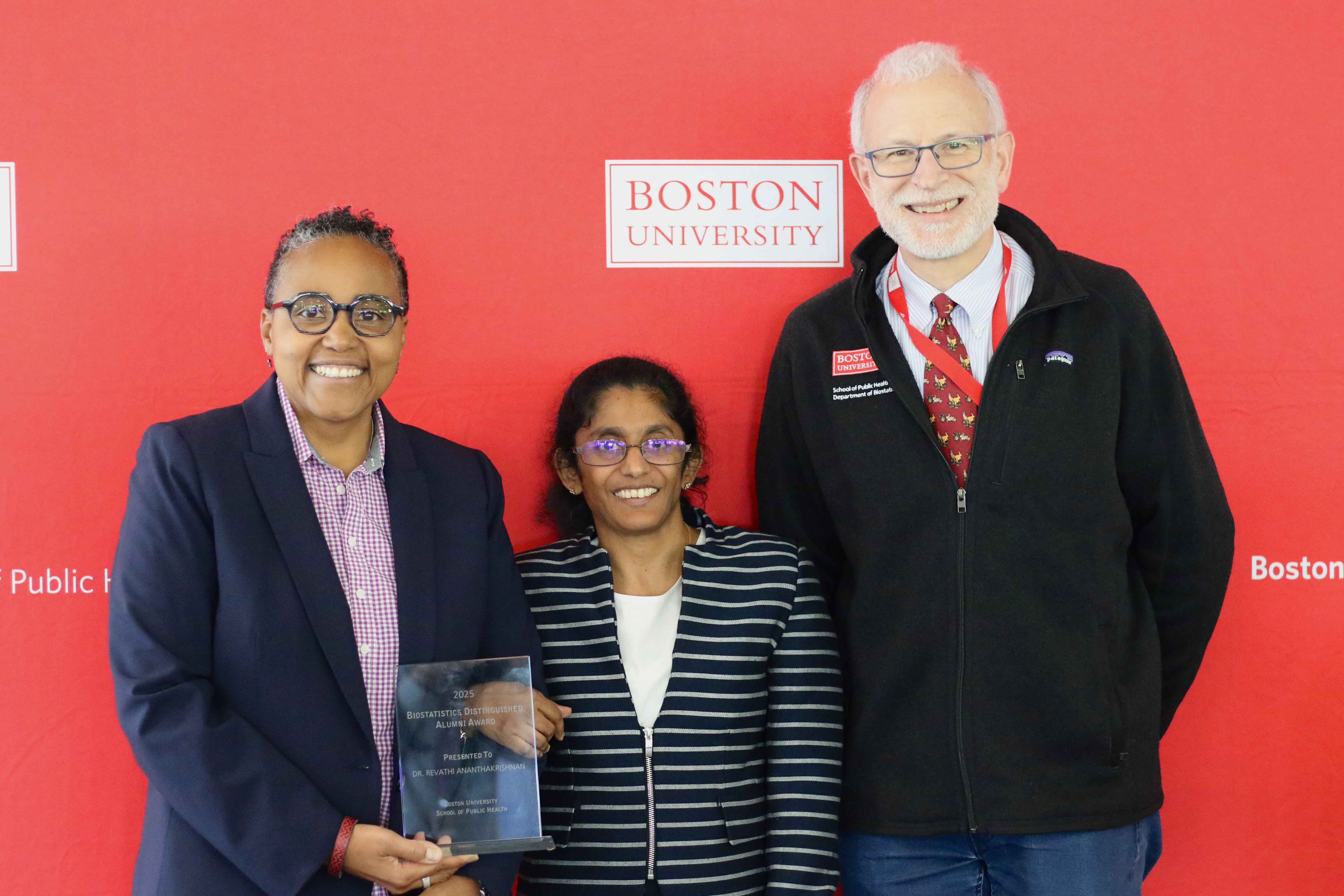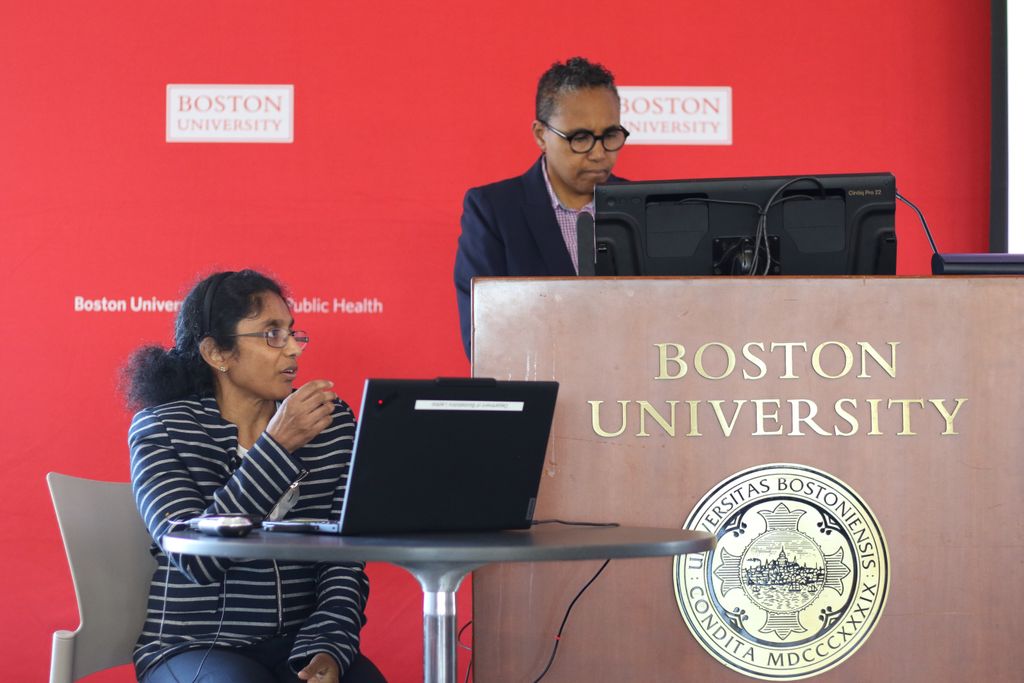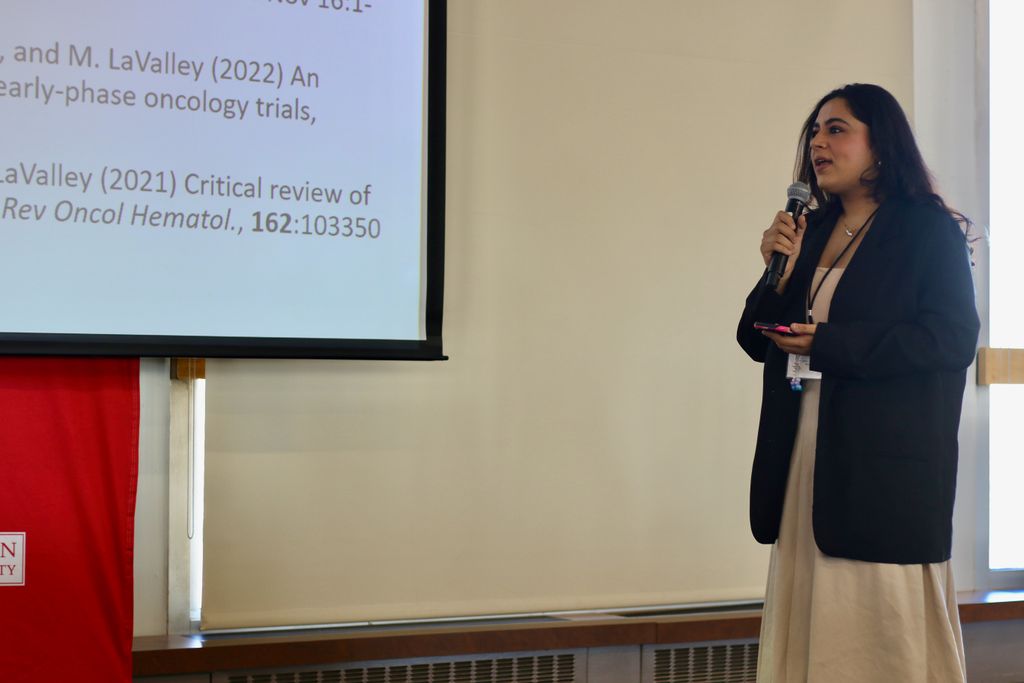Revathi Ananthakrishnan Receives 2025 Biostatistics Distinguished Alumni Award.

Scarlett Bellamy (left), chair and professor of biostatistics, and Michael Lavalley (right), professor of biostatistics, present Revathi Ananthakrishnan (SPH ’17) with the 2025 Biostatistics Distinguished Alumni Award.
Revathi Ananthakrishnan Receives 2025 Biostatistics Distinguished Alumni Award
Ananthakrishnan (SPH ’17) earned her master’s and doctoral degrees in biostatistics while working full-time in the pharmaceutical industry on clinical trials testing cancer immunotherapies.
The Department of Biostatistics at the School of Public Health has named Revathi Ananthakrishnan (SPH ’17) the recipient of the 2025 Biostatistics Distinguished Alumni Award. Ananthakrishnan, a biostatistician at Bristol-Myers Squibb, accepted the award and gave a presentation on designing, analyzing, and interpreting immuno-oncology trials at SPH on October 3.
The annual award recognizes an alum from any graduate-level biostatistics program at Boston University whose career embodies SPH’s core purpose to “Think. Teach. Do. For the health of all.” This includes notable contributions to the field, such as publishing peer-reviewed articles, teaching and mentoring the next generation of biostatisticians, and doing work that impacts underserved populations.
Ananthakrishnan began her career in the pharmaceutical industry as a biostatistician in the oncology division of Pfizer, and later Celgene, after earning her PhD in theoretical biophysics. As she progressed in her work, Ananthakrishnan soon realized that she would benefit from dedicated training in biostatistics and enrolled as a part-time student at SPH.
“Revathi demonstrated astounding focus and discipline, managing to continue working full-time while earning both her master’s and her second PhD over the course of seven years at SPH,” says Scarlett Bellamy, chair and professor in the Department of Biostatistics.

Today, Ananthakrishnan holds a director-level role at Bristol-Myers Squibb, which purchased Celgene in 2019. Over the course of her career with the company, she has worked on numerous targeted immunotherapies for treating solid tumors and blood cancers, including bosutinib, a kinase inhibitor for chronic myeloid leukemia; inotuzumab, a monoclonal antibody-based chemotherapy for acute lymphocytic leukemia; and two FDA-approved CD19-targeted chimeric antigen receptor (CAR) T-cell therapies, JCAR017 for non-Hodgkin lymphoma and ide-cel for multiple myeloma. In the case of JCAR017, Ananthakrishnan served as the lead statistician for regulatory submissions to the EU, Japan, Canada, and Switzerland.
Ananthakrishnan explained how these therapies have revolutionized personalized cancer treatment and began her presentation by sharing the story of Emily Whitehead, the first pediatric patient to receive CAR T-cell therapy from the Children’s Hospital of Pennsylvania in 2012. Ten years later, Whitehead was declared cancer free, and she is now an undergraduate at the University of Pennsylvania. Ananthakrishnan went on to cover the basics of cancer cell biology, classic pre-clinical and early phase oncologic study design, and the mechanism, safety, and efficacy of CAR T-cell therapies. She emphasized that in some patients, like Whitehead, a single dose of CAR T-cell therapy has shown a notably durable response. By targeting cancer cells and leaving normal, healthy cells unscathed, the therapy has allowed patients to live longer lives with less side effects than traditional chemotherapies.

In addition to her work on clinical trials, Ananthakrishnan has also applied her broad expertise in physics, biology, mathematics, and statistics to the publication of a variety of journal articles and book chapters, including articles on applied oncology and innovative phase I/II trial designs, a review of non-proportional hazards in oncology clinical trials, and a review of the different adaptations of the Bayesian BOIN trial design. She has held several positions in the American Statistical Association (AS) New Jersey Princeton-Trenton Chapter over the years, including secretary, president-elect, and president, and is a core member of the ASA Scientific Working Group on Cell and Gene Therapies. She has also encouraged early career statisticians to join her in the industry as a part of the organizing committee for the Statistics in Pharmaceutics conference for the past three years.
Looking to the future, Ananthakrishnan expects biostatisticians will play a key role in the continued development of CAR T-cells therapies and help to develop innovative new trial designs that integrate real-world data to assess their long-term effectiveness and analyzing patient characteristics, genetics, and other variables to identify biomarkers that might predict a patient’s response to the therapy.
